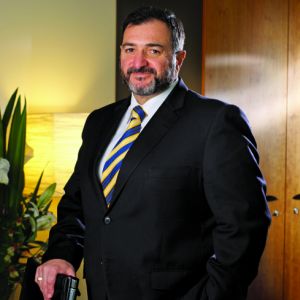
Fancy a life as a franchisee in the hospitality sector? If running an accommodation business is in your sights, what skills will you need to bring?
The travel and tourism market is tough. But, say franchise players in this arena, there is still plenty of business to be done.
Quest
Paul Constantinou [pictured], who heads up Quest Serviced Apartments, a property group directed at the business market, says “Given the overall climate, we’ve done well, we’ve stayed very focused.
“We watch and listen to customers whoever they are; we’ve watched how their needs have changed. One aspect is the needs within the business – we’re a product there to help them do their job – and to create a good environment to get work done.”
The Quest business model is to outsource extras – food and beverage, for instance – that require specific skill sets and training.
“We focus on core character traits rather than skill sets,” he says. “Anyone can make a bed, anyone can check someone in. Technology just helps. We focus on people who can build relationships, who can talk person to person.”
Franchisees don’t need specific experience or a string of qualifications; they don’t need a hospitality background – in fact, 70 percent of the franchise network comes from outside the sector. But they need to be good at building relationships.
“There are only two occasions when you get to see the customer, they don’t hang around, so make sure you’re at the point of contact – checking in and checking out.”
What is also essential for Constantinou is that franchisees have clear goals, and that these are allied to the franchisor’s aims, whether these are financial or human goals. “If there’s no alignment with us, it’s just coming to work as an employee.
“We want someone who always tries to do a bit better – your personal best – one percent better each week. If you get that right, everything else follows. Disciplines and systems don’t make it work. We need franchisees driving the franchisor. If they ask the questions, we keep evolving.
“We can’t change everything at once. And what got us here isn’t going to get us there. It’s easy to make changes when you want to, not so easy when you are forced to.
“We have to consider what our customers are doing tomorrow; where will they want to stay? Some of the business is not doing so well. Retail work won’t be the same, we might like it to be, but it won’t be. We have to look at skill sets meeting our customer needs.”
Corporations are trying to manage travel costs and frequently use travel managers; Quest account managers liaise with both parties. Constantinou believes there is too much emphasis on price-conscious web-based travel arrangements which don’t suit business. “Corporations don’t want this, they want certainty.”
Anyone travelling for work wants efficiency and a friendly face; creating a successful model in this market is not about marble tops or teak, he says. “We try to create an environment that people want to come back to. We build a culture through staff.”
Accor
The Accor chain has more than 3500 hotels throughout the world, and more than 70 franchised in Australia and New Zealand. Neil Scanlan is general manager of Accor franchise hotels.
“We franchise a myriad of our brands; the most franchised are Mercure and All Seasons. These are non-standardised brands and the power of the brand is important.”
Scanlan explains the foundation of the franchise offer. “We’ve got four pillars: the brand; distribution – this is the web, access to travel agents and the backbone of reservations. We need to be seen, accessible and live. The third is loyalty, with our Accor members brought to the franchisee; and then, there’s procurement and huge purchasing power.”
The appeal of a well-known brand behind a business is undeniable, says Scanlan. “We are getting more calls than ever because people identify that it’s tough, and you’re not going to maximise returns by yourself.”
Linking to a franchise chain gives franchisee support in their business, not just through the brand name but in practical terms such as IT. “Independent operators are finding the cost of technology is difficult to meet,” Scanlan says.
“What we’re looking for is someone with previous experience in the hospitality industry, someone with a basic understanding of customer service. Especially in the smaller hotels we want someone who will be involved in the business. In our larger franchises it’s more of an asset,” he says. Whatever the level though, it’s about engagement from the top.

